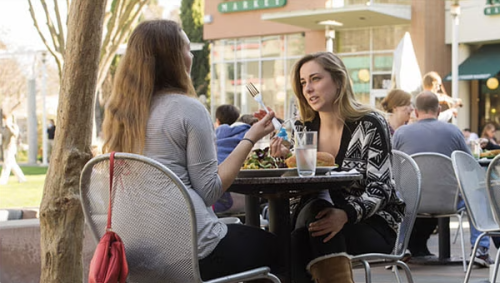Friday, June 20
Keynote Panel
Friday, June 20
10:45 a.m. - noon
Join us for a dynamic keynote panel featuring four distinguished academic leaders from across the University of California system. Each panelist brings a unique perspective shaped by their leadership experience in major administrative roles at their respective campuses. The session will open with brief introductions from each panelist, followed by a moderated Q&A led by Laci Gerhart. The session will conclude with an open Q&A, offering attendees the opportunity to engage directly with the panelists.
Get to know the panelists:
Robin Dunkin

Robin is an Associate Teaching Professor in the Ecology and Evolutionary Biology Department at UC Santa Cruz. She is also the Faculty Director of the UCSC Teaching and Learning Center.
Rachel Kennison

Rachel is an Associate Professor of Teaching in the Ecology and Evolutionary Biology Department at UCLA. She is also the Executive Director of the Center for Education, Innovation and Learning in the Sciences (CEILS) and the Administrative Co-Leader, Center for the Integration of Research Teaching and Learning UCLA@CIRTL.
Mike Wilton

Mike is an Associate Teaching Professor in the Molecular, Cellular, and Developmental Biology Department at UC Santa Barbara. He is also the Associate Dean for the UCSB College of Letters and Sciences Division of Undergraduate Education.
Brian Sato

Brian is a Professor of Teaching in the Molecular Biology and Biochemistry Department at UC Irvine. He is also the Associate Dean for the UCI Division of Teaching Excellence and Innovation.
Talks
Session 1
Friday, June 20
1 - 2 p.m.
- Data-driven assessment of geographical inequities in California public high schools
Author(s): Ali Moghimi; Kyra Liu; Lucas Mitchel
In this study, we conduct a data-driven assessment of county-level disparities in college-going rates across California’s public high schools by integrating machine learning models and geospatial analysis with school- and neighborhood-level data. We analyze key predictors of college enrollment, including socioeconomic factors, school funding, student demographics, and academic resources. In addition, we aim to identify which counties experience the greatest inequities and the underlying drivers of these disparities. Our approach allows us to quantify the impact of school- and neighborhood-level factors on college-going rates and highlight counties that face the most severe barriers to higher education access. These insights will inform targeted policy interventions, including resource allocation, enhanced college-preparatory programs, and institutional support for underrepresented communities. By addressing geographical inequities, this study seeks to provide data-driven recommendations for improving educational access and fostering long-term social and economic mobility across California.
- Mastery Learning through “A’s for All” (as time and interest allow)
Author(s): Dan Garcia
Traditional grading paradigms often fail to cater to diverse learning paces and styles, potentially sidelining those needing more time to learn the material. "A's for All" (as time and interest allow) is an innovative pedagogical philosophy that builds on grading for equity, mastery learning, growth mindset, and competency-based approaches. It provides every student the opportunity and time they need to learn the material, including working beyond the term. It removes barriers and late penalties, and sends a strong signal to students that they can achieve any level of mastery they want, if they are willing to put in the time and effort.
Attendees will walk away with a deeper understanding of the principles and practicalities of "A's for All" and actionable insights to refine and enhance their own teaching methodologies. We hope this gathering will sow the seeds for a more inclusive, flexible, and student-centric future in STEM education.
- Undergraduate Tutoring to Fill the Gap
Author(s): Neftali Watkinson
As the University adapts to the new reality of increasing TA to student ratios, we can't afford to let our students fall through the cracks. In this presentation I will talk about how the Undergraduate Learning Assistant program at UCR's Department of Computer Science and Engineering has adapted to become a reliable resource for our undergraduate students seeking for help.
Career Development Breakout Sessions
Friday, June 20
2:15 - 3:15 p.m.
- Developing Scholarly Activities
Location: Ballroom A
- Navigating Tenure
Location: Ballroom B (Side B)
- Navigating the Transition to Full Professor
Location: Meeting Room 1
- Planning for Sabbatical
Meeting Room 2
Talks
Session 2
Friday, June 20
3:30 - 4:30 p.m.
Sparking Joy in Teaching: Reimagining How Learning Can Embrace Change
Author(s): Jackie Shay
The modern academic landscape often prioritizes failure, burnout, and rigid notions of rigor, leaving students disengaged and educators struggling to inspire. In an era where AI can generate polished responses, what does it truly mean to learn, engage, and be human? Many students feel disconnected, weighed down by existential concerns and the transactional nature of education, where grades overshadow intellectual and personal growth. At a time when joy feels scarce, it is crucial to reintroduce it into learning—not as a masking emotion, but as a pedagogical foundation that embraces discomfort, uncertainty, and change. Joy-centered pedagogy fosters connection, curiosity, and resilience, transforming classrooms into spaces where learning is meaningful and engaging. In this talk, we explore the principles of joy-centered pedagogy and share concrete strategies for cultivating joy in teaching—reframing assessment, fostering belonging, and creating learning environments that inspire both students and educators.- A CURE-ious Exploration of Undergraduate Peer Teaching Programs at UC Davis
Author(s): Miriam Markum
Undergraduates that support their peers’ learning in and out of the classroom are an integral part of the teaching mission at UC Davis. One type of peer learning facilitator is the Learning Assistant (LA). LAs are defined as undergraduates trained in pedagogy, prep as a team, and facilitate student learning in class. LA support in class provides many benefits to the students, including better mastery of concepts, reduced failure rates, greater scientific identity, and higher satisfaction with the course (e.g., Otero, 2010; Talbot 2015; Close, 2016; White, 2016; Sellami, 2017). Similarly, LAs benefit from the professional development opportunity, develop their professional and scientific identity, and increase their conceptual mastery (Schalk, 2009; Otero, 2010; Nadelson, 2014; Close, 2016). Despite these potential benefits, our campus does not have a centralized program for LAs or other undergrads who facilitate learning in the classroom. As a result, the number of such facilitators, the roles they play, their training, and the support they receive, has been largely unknown. As part of a course-based undergraduate research experience (CURE) course, student researchers interviewed instructors and staff that integrate undergraduate peer learning facilitators into their teaching teams as well as the facilitators themselves. In this presentation, I will share our preliminary findings of convergent and divergent elements in such programs, as well as the facilitators’ perceptions of the programs.
- Using Stories From Traditional Culture to Teach Virtue-Based Engineering Ethics
Author(s): Jiamin Zhang
Engineers play a pivotal role in society. Therefore, it is critical to train engineering students to be ethical engineers. To address current challenges in engineering ethics education, we use stories from traditional culture of different countries to help engineering students identify virtues present in the stories and make connections to engineering ethics. The teaching modules include short virtue-of-the-week stories and team-based class activities for connecting virtues to ethics. Preliminary findings from the pilot study in a capstone design course at a large public university in the US show that most students think the stories from traditional culture help them better understand virtues and act as an ethical engineer. Additionally, results from course surveys suggest that students are engaged and interested in our approach. A qualitative analysis of students’ written responses also suggest that the stories help students with ethical decision-making. Our study will advance knowledge in the field of engineering ethics by investigating how stories from traditional culture help students understand engineering ethics and inform students’ ethical decision-making.
- Impact of Variable Exam Weighting on Student Performance and Attitudes
Author(s): Samantha Scudder, Thomas Sprague
I will be presenting data from an ongoing research project that evaluates the impact of various course elements and policies on student performance and attitudes in large, required STEM courses. Specifically, I will present data collected from high-enrollment (350 students) Biopsychology and Cognitive Psychology offerings at UC Santa Barbara. For this presentation, I will focus on the impact of a variable exam weighting policy. With this policy, three exams are administered throughout the course and the scores are differentially weighted in the final exam calculation based on each student's performance on the exam; for example, a student's best exam can be weighted at 30% of the final grade while the worst may be weighted at 15%. I have observed that this approach provides a small boost to the overall grade average, but that this may preferentially support students with effectors of opportunity (first-generation status, transfer status, etc). I will also report on survey data gathered about this course practice, highlighting how students perceive the grading policy and view their own effort and performance.
Networking Dinner (optional)
Friday, June 20
Post-conference

Join fellow attendees for a casual networking dinner held in downtown Davis. Attendees can convene at the G Street Block, which is a pedestrian-only section of G Street, between 2nd and 3rd streets (map of location here). The block has open public seating near a number of eating and drinking establishments, including Woodstock Pizza, Three Mile Brewing, Pho Yummy, Kathmandu Kitchen, Jusco Sushi, Red 88, Open Rice Kitchen, Davis Beer Shoppe, and Shipwrecked Tiki Bar. Many other restaurants are less than a block away as well. Groups can distribute throughout these restaurants (especially if eating indoors is preferred) or get food to-go and eat in the public space on G Street.
Saturday, June 21
Talks
Session 3
Saturday, June 21
9 - 10 a.m.
- Empowering Public Health Students Through Transfronteriza Rasquache "no-muralismo": Exploring Women’s Health and Health Equity in a Virtual World
Author(s): Angie Denisse Otiniano Verissimo, Liliana Conlisk Gallegos
Transfronteriza Rasquache "no-muralismo” is a rigorous artistic transdisciplinary pedagogical methodology and powerful tool. Students will explore this artisanal hand-made approach to immersive world-making in new media art through “no-muralismo,” an example of new media arts praxis rooted in Chicana, decolonial, transborder theories, and the exploration of Indigeneity. This approach demystifies VR production for the purposes of healing and other pedagogical applications, both within and beyond academia. Part of the Monuments to the Pluriverse VR exhibition (Fall 2025), students will co-develop a VR world with their instructor, focusing on diverse women’s health topics. Using cutting-edge generative AI, they will create an interactive educational artistic tool highlighting racial/ethnic identity, social justice, and public health inequities. The project emphasizes ethical AI use while fostering technical and critical thinking skills. Additionally, it aims to cultivate a sense of belonging and assess its impact on social justice orientation and inclusion within the academic community.
- What Good is Writing in the Age of AI?
Author(s): Goldberry Long
Students are increasingly using Generative Artificial Intelligence (AI) to complete their writing, raising concerns about how to stop cheating. However, a better solution may be to ask what writing tasks AI cannot perform. Writing is not just a product; it can be a tool for thinking and inquiry. Writing for inquiry (WI) facilitates synthesis—the discovery of connections between prior knowledge and new concepts—and ideation, or the generation of novel, usable solutions to problems. Both of these require cognitive flexibility and critical thinking, vital skills in our rapidly changing world. To foster WI, instruction must shift from meeting final-draft standards to teaching writing as a dynamic, exploratory, and sometimes messy process. However, students trained to prioritize correctness often struggle with WI because it demands tolerance for imperfection.This presentation discusses one WI intervention, powerwriting, that offers scaffolded strategies designed to support students learning to use writing for thinking.
- Reducing Accent-Based Biases in Students’ Evaluations of Teachers
Author(s): Melissa Paquette-Smith
Students may perceive that they learn less when they are taught by instructors who speak English with non-native accents, even when there are no actual differences in their learning. My research investigates the impact of an intervention designed to reduce the negative impact of accent-based biases on student evaluations of teaching (SETs). I will discuss the findings of lab studies in which undergraduate student participants (n = 100 per study) are randomly assigned to listen to a 6-minute lecture produced by either an American- or a Mandarin-accented instructor. After the lecture, participants in the intervention condition watch a short instructional video designed to make them aware of their unconscious biases before evaluating the instructor’s effectiveness. My findings suggest that, in some circumstances, instructions to avoid bias can be effective in reducing bias; however, the size of this effect varies depending on the type of lecture materials. Interventions such as the one described here show promise in reducing real-world biases in college classes and have important implications for improving equity and inclusivity in higher education.
- Impact of Ethnic Studies Courses on Student Retention
Author(s): Natalia Caporale
In the US, ethnic minorities continue to be underrepresented across Higher Education. This is the result of the disproportionate attrition from college by minoritized populations due to the confluence of discriminatory systemic and disciplinary factors negatively impacting these students' college experiences. Increasing retention of these groups requires a multidimensional approach accounting for factors such as gender and ethnic identity, self-efficacy, sense of belonging, and academic culture. Prior studies in K-12 have shown that Ethnic Studies courses strengthen academic engagement and empowerment for students of color. At present, however, little data is available on the potential impacts of Ethnic Studies courses on educational outcomes for college students. At UC Davis, ~11% of all students take at least one Chicana/o Studies course (CSC), making it an ideal place to examine this question. We conducted a quantitative analysis (mixed linear regression) of outcomes for ~120,000 UC Davis students entering the university between 2000-2016 (~13,000 taking CSCs). Results show that taking CSCs is associated with a significant increase in the likelihood of graduation across a wide range of first term GPAs. This benefit was observed across all demographic variables examined. The impact seems to be larger for minority students, and similar across gender. I will also discuss preliminary results from a mixed survey of students taking CSC courses about their motivations and the course impact and share initial findings from semi-structured interviews of ~ 20 URM students who took these courses.
Poster Session
Saturday, June 21
10 - 11 a.m.
- A comparison of student learning outcomes in General Chemistry courses delivered in traditional, hybrid, and remote modalities
Author(s): Anne R. Sizemore, Elise M. Heiss, Shannon K. Corcoran, Jillian Snook, Jillian L. McCue - Scaling Up Project-Based Learning in General Education: Undergraduate Tutors as Instructional Support for Collaboration
Author(s): Brenna Gomally - Biology Pedagogy Course Impacts for Instructional Assistants
Author(s): Claire Meaders - Teaching Under (Structural) Constraint: Challenges for Sociology Instructors and teaching Assistants across the University of California System
Author(s): Emily K Carian and Amanda Mireles - Increasing Equitable Access to Undergraduate Field Science Opportunities
Author(s): Iris Holzer - Exploring relationships between student stress, uncertainty, and classroom transparency
Author(s): Isabella Maita - A course redesign project for the inclusion of neurodiverse learners
Author(s): Jason White - Preparation for Medical Education at UC Merced, Strategies for a Smooth Transition
Author(s): Julia Alvarez, Jazmine Kenny, Susan DeRiemer - A Module-based Redesign of a Large Enrollment Introductory Biology Course
Author(s): Marshall McMunn and Laci Gerhart - Iris: An AI-enhanced Content Management System Supporting Accessibility
Author(s): Wong Zhao and Maryam Majedi - Game On! Role-Playing Fosters Socioscientific Reasoning and Critical Thinking in First-Year Undergraduates
Author(s): Michelle Velasco, Owen Bella, and Michelle Rensel - Walking in another’s shoes: Practicing Cognitive Empathy to Enhance Learning about Disease and Society
Author(s): Sara Dye - A course redesign aimed at promoting self-competence in scientific writing, communication, and analytical skills
Author(s): Selene Bobadilla - Bridging gaps in prior knowledge to prepare for molecular and cellular biology
Author(s): Shana Welles and Megan Workman - Addressing the Empty Classroom: Incentivizing Attendance in Large Lectures
Author(s): Steven Barrera - AI Assistant Pacing’s Impact on Student Learning
Author(s): Tom Yeh - Teaching Engineering through Active Learning Utilizing a Project Based Example
Author(s): Abbas Ghassemi - Engaging Undergraduates in Ocean Science through Podcasts
Author(s): Alexandra Phillips - Rapid feedback loops and automated grading using Otter-Grader: Insights from applications in a beginners programming course
Author(s): Carmen Galaz García and Annie Adams - Rising Effectiveness of Pre-Laboratory Preparation with Auto-Quizzes
Author(s): Dmytro Zagrebelnyy - Canvas - GitHub - JupyterHub integration tools for programming classes
Author(s): Jason Fleischer and Yuanjia Yang - Sense of Belonging: Comparison of a UC, CSU, and Community College
Author(s): Lindsay Crawford - Bringing the Virtual Classroom to Life: A VR Student Behavior Simulator
Author(s): Salma Elmalaki - Developing a community of practice
Author(s): Victoria Cross, Annie Ditta and Melissa Paquette-Smith - Scientific research, collaboration, and community in a Course-based Undergraduate Research Experience
Author(s): Whitney Duim - Decreased Perceived Conflicts between Religion and Evolution
Author(s): Anna James and Morgan Gainer - Advancing and Elevating TA Professional Development in the MCDB Graduate Program
Author(s): Natalie Pedicino, Jillian Porter, Roxanna Villalobos, Kendra Dority and Giulia Gurun - From Intent to Impact: Supporting Faculty in Active and Inclusive Teaching
Author(s): Michal Shuldman - Near-Peers at the STEM Gateway: Learning Assistants in General Chemistry
Author(s): Julia Chamberlain - Beyond the Blueprint: Culturally Responsive Design and the Art of Storytelling
Author(s): Ethan Hollinger - A discipline-specific pedagogical professional development graduate program fosters development of integrated scholars: an evaluation of the Future Undergraduate Science Educators (FUSE) program
Author(s): Marina Ellefson and Mona Monfared - The Impact of Learning Strategies and Mind Mapping on Student Academic Performance
Author(s): Sahamaz Baghdadchi, Parham Farshihaghro, Huihui Qi, Minju Kim, Curt Schurgers, Alex Phan - Experiences and Outcomes of STEM Students on Academic Probation
Author(s): Natalia Caporale, Ambar Hernandez Negrete, Natalia Deeb Sossa, Lina Mendez, Montserrat Valdivia Medinaceli - Beyond the Hype: AI Tutoring and Learning Tools in the Real Classroom
Author(s): Sylvain Masclin - Designing Research Method Curricula for Undergraduates Healthcare Students Through an Andragogical Lens
Author(s): Claudia Davis - Mastery Grading in Large Enrollment General Chemistry
Author(s): Josh Hartman
Research Collaboration Networking
Saturday, June 21
11 a.m. - noon
